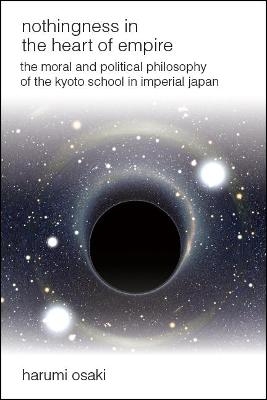
Nothingness in the Heart of Empire
State University of New York Press (Verlag)
978-1-4384-7309-3 (ISBN)
In the field of philosophy, the common view of philosophy as an essentially Western discipline persists even today, while non-Western philosophy tends to be undervalued and not investigated seriously. In the field of Japanese studies, in turn, research on Japanese philosophy tends to be reduced to a matter of projecting existing stereotypes of alleged Japanese cultural uniqueness through the reading of texts. In Nothingness in the Heart of Empire, Harumi Osaki resists both these tendencies. She closely interprets the wartime discourses of the Kyoto School, a group of modern Japanese philosophers who drew upon East Asian traditions as well as Western philosophy. Her book lucidly delves into the non-Western forms of rationality articulated in such discourses, and reveals the problems inherent in them as the result of these philosophers' engagements in Japan's wartime situation, without cloaking these problems under the pretense of "Japanese cultural uniqueness." In addition, in a manner reminiscent of the controversy surrounding Martin Heidegger's involvement with Nazi Germany, the book elucidates the political implications of the morality upheld by the Kyoto School and its underlying metaphysics. As such, this book urges dialogue beyond the divide between Western and non-Western philosophies, and beyond the separation between "lofty" philosophy and "common" politics.
Harumi Osaki is an independent scholar who received her PhD in contemporary French thought from Hitotsubashi University in 2003 and went on to complete a second doctorate in Japanese philosophy from McGill University in 2016.
Abbreviations
Preface
Introduction
Part I. "Overcoming Modernity" and "The Philosophy of World History"
1. Nishitani Keiji and the Bungakukai Symposium "Overcoming Modernity"
2. The Chūōkōron Symposia Concerning the Philosophy of World History
3. The Unity between the Subject and the Substratum of the State: The First Characteristic of Japanese National Subjectivity
4. The Interpenetration between the National and the International: The Second Characteristic of Japanese National Subjectivity
5. The Reciprocal Determination between the Virtual and the Actual: The Third Characteristic of Japanese National Subjectivity
6. The Outcomes of the Two Projects at Stake in Japanese National Subjectivity
Part II. A Political Dimension of Nishida Kitarō's Philosophy of Nothingness
7. Questions Concerning Nishida and Japanese Subjectivity
8. Nishida's Political Thoughts Concerning Japanese National Subjectivity
9. The Significance and Problems of Nishida's Arguments about Kokutai
10. Nishida's Criticism of Hegel with an Eye to Overcoming Western Modernity
11. Examining Nishida's Philosophical Project of Overcoming Western Modernity
12. Reconsidering the Issues of Kokutai and Overcoming Modernity
Conclusion
Notes
Bibliography
Index
| Erscheinungsdatum | 13.03.2019 |
|---|---|
| Zusatzinfo | Total Illustrations: 0 |
| Verlagsort | Albany, NY |
| Sprache | englisch |
| Maße | 152 x 229 mm |
| Gewicht | 227 g |
| Themenwelt | Geisteswissenschaften ► Geschichte ► Regional- / Ländergeschichte |
| Geisteswissenschaften ► Philosophie ► Östliche Philosophie | |
| ISBN-10 | 1-4384-7309-5 / 1438473095 |
| ISBN-13 | 978-1-4384-7309-3 / 9781438473093 |
| Zustand | Neuware |
| Haben Sie eine Frage zum Produkt? |
aus dem Bereich


